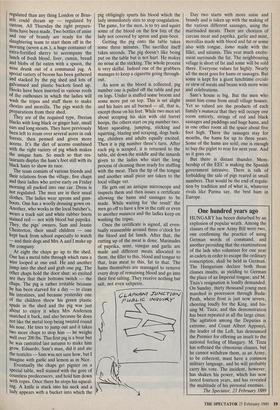One hundred years ago
HUNGARY has beeen disturbed by an explosion of popular wrath. Among the clauses of the new Army Bill were two, one confirming the practice of using German words of command, and another providing that the examinations of the lads who volunteer for one year as cadets in order to escape the ordinary conscription, shall be held in German. The Hungarians declare both these clauses insults, as yielding to German the place of an Imperial tongue; and M. Tisza's resignation is loudly demanded. On Sunday, thirty thousand young men marched in procession through Buda- Pesth, where frost is just now severe, cheering loudly for the King, and his- sing M. Tisza; and this demonstration has been repeated in all the large cities. The agitation among the Deputies is extreme, and Count Albert Apponyi, the leader of the Left, has denounced the Premier for offering an insult to the national feeling of Hungary. M. Tisza has softened the obnoxious clauses, but he cannot withdraw them, as an Army, to be coherent, must have a common military language, and he will probably carry his vote. The incident, however, has shaken his power, which has now lasted fourteen years, and has revealed the multitude of his personal enemies.
The Spectator, 23 February 1889
















































 Previous page
Previous page